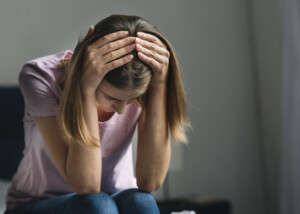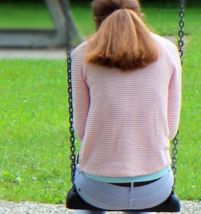
Depression can cause constipation. However, if your depression has caused constipation, you may not even know it.
“The range of normal bowel movement frequency is from one BM in three days to three BMs in one day,” begins David D. Clarke, MD, President, Psychophysiologic Disorders Association, Clinical Assistant Professor of Gastroenterology Emeritus, Oregon Health & Science University, Faculty Associate, Arizona State University.
Dr. Clarke continues, “Fewer BMs than this is considered constipation. In depression, though definitive studies are lacking, when constipation occurs it is likely that it results from slowing of the muscle contractions of the large intestine (colon).
“The slower contractions cause the feces to move more slowly. In addition, the resulting greater duration of contact of the feces with the colon results in more water being absorbed — causing the stools to harden.”
The information you’re about to read is based on my mother’s constipation, and how her depression led up to it.
A person with major depression typically abandons their usual eating habits and lessen water intake.
My mother one day complained of constipation. But she had had this several times before during her course of depression. We thought it might be related to side effects of painkillers.
- But this time, we couldn’t blame painkillers because she had quit taking them not long prior.
- And this time, the constipation was not resolvable.
We took her to the ER and the doctor said she had a huge bowel movement that couldn’t make an exit, and he’d have to “dig it out.”
Later the doctor said there’d been about two feet worth of bowel movement, and that there was still more BM in there.
How could this be, if my mother had reported a bowel movement that morning, and if she’d been having bowel movements over the past many days?
The doctor said that a person could have bowel movements and simultaneously develop chronic constipation, in that while bowel movements may occur daily, fecal buildup occurs inside the colon over time: a simultaneous process.
He said that my mother’s bowel movement buildup may have taken place over a few weeks’ time, all while she was actually having bowel movements every day or almost every day.
She had compacted fecal material in the colon, and on that fateful day, it caught up with her and resulted in constipation that did not respond to edemas, suppositories or time.
Coinciding with the past few weeks were erratic eating habits, excessive inertia and low water intake.
These three problems were from depression, even though my mother was on an antidepressant.
The problem was that beginning a few weeks prior, the antidepressant lost steam and had to be increased in dosage.
There were a few days there where depression symptoms returned, thus suppressing my mother’s desire for food and fluids.
After we increased the dose, everything was fine, but then she started showing signs of relapse again.
This time we wondered if the increased dose was causing the extreme lethargy, fatigue and desire to sleep all the time. And once again, her appetite and desire for fluids was suppressed.
Even on better days, my mother didn’t eat so well, and she was never one to drink much water.
Erratic eating habits, going long periods without food, and inadequate water intake (all common results of depression) can very much lead to constipation in the form of built-up fecal material.
Depression also causes inertia and the desire to sleep a lot or just sit around not doing anything.
We noticed that my mother, after responding well to the antidepressant, was gradually beginning to want to spend more and more time sleeping or sitting around. We wondered if the antidepressant was losing its steam again.
At any rate, all that inactivity contributed to the constipation because inertia suppresses voiding.
My mother was eventually diagnosed with hypothyroidism (several days before the major constipation episode), and it’s possible the clinical depression was secondary to the hypothyroidism, which would explain why she began showing signs of relapse despite being on 90 mg of the antidepressant.
The hypothyroidism perhaps began escalating and apparently was fighting against the antidepressant.
But even after she began taking Synthroid for the hypothyroidism, the extreme fatigue continued getting worse. This didn’t make sense…
…Until the ER doctor informed us that she had all that backed-up fecal material in her, stuck inside three feet worth of colon.
We were given instructions on what to do to get the remainder of bowel movement out over the next few days.
As a bunch of bowel movements began coming, once the home treatment started, my mother’s energy returned.
It’s a vicious cycle: Depression causes inertia. Inertia leads to constipation. Backed-up fecal material that’s been sitting in the colon for days and days will weaken the body and drag it down.
If you know someone who has depression and is getting increasingly tired and fatigued, despite being on an antidepressant, consider the possibility that he or she has impacted fecal material inside their colon, weighing them down and making them feel sick.



























